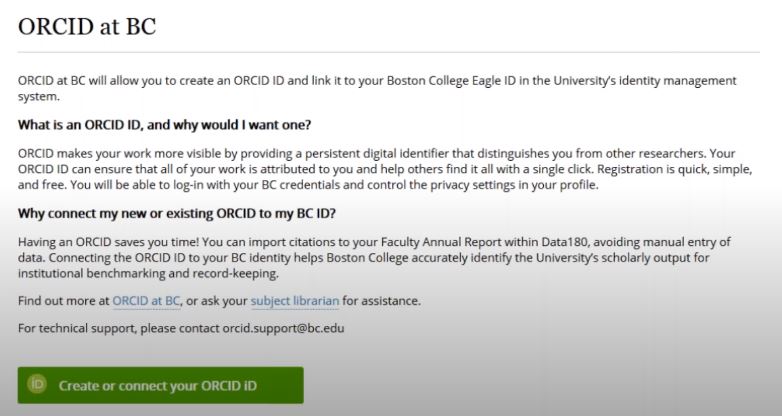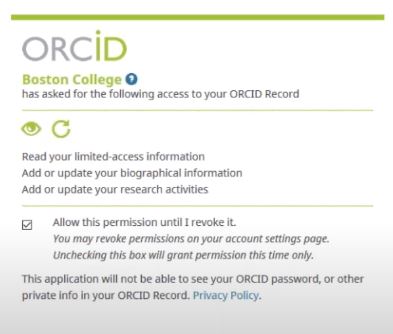
Boston College is one of the ORCID US Community member institutions leading the way for ORCID adoption at US research institutions (see current member list). Boston College became an ORCID member so they could take advantage of the name disambiguation, interoperability, and time-saving benefits of ORCID as a single identifier for researchers to use throughout their career, regardless of changes in name, discipline, or location. Boston College’s ORCID Libguide provides an excellent example for others to follow in promoting ORCID: https://libguides.bc.edu/orcid.

Boston College (BC) has integrated ORCID into their central identity management system to create an application known as “BC Create or Connect,” which provides a single portal for researchers at Boston College to start their journey with ORCID. The application allows researchers to register and connect their ORCID iD to their BC Eagle ID through the HR system PeopleSoft. From there, the system is configured to write/assert employment affiliation information to researchers’ ORCID records and collects ORCID iDs to display on public facing faculty profile pages.
A walk-through of the integration:
- Researchers at Boston College go to http://www.bc.edu/orcid where they are taken to a screen asking them to login with their Eagle ID. This allows the system to verify the user and make sure they are in fact affiliated with the institution.
- Once they log in with their institutional credentials, they are taken to a main ORCID page, “ORCID at BC” that explains what ORCID is and prompts users to “Create or Connect” their ORCID iD:

- When a user clicks on the green “Create or Connect” button, the user is then asked to authorize permission for the institution to connect with their ORCID iD. In the case of Boston College, users are asked to allow BC to read any limited-access information they may have on their ORCID record (ORCID data visibility can be set set to public, private, or “trusted parties”/limited access), add or update biographical information on the user’s ORCID record, and add or update the user’s research activities:

- From there, they will be asked to either log in to their ORCID record if they already have an ORCID iD, or they will be asked to register for an ORCID iD if they don’t have one yet. (It is free to register for an ORCID iD, and it takes very little time.) This process ensures that the connection between ORCID and Boston College is authenticated and trustworthy.
- When a user authorizes these permissions, Boston College can then easily gather data about researcher activity through ORCID, as well as make trustworthy and accurate assertions about the faculty that are affiliated with the institution, providing a verified source confirming that this person does in fact work at Boston College:

The authenticated ORCID iD is then displayed on faculty’s public facing profile pages (see example here):
For more information, please contact orcidus@lyrasis.org. Many thanks to John O’Connor, Scholarly Communications Librarian at Boston College, for sharing this information via webinar (recording available 1:55-8:35).
